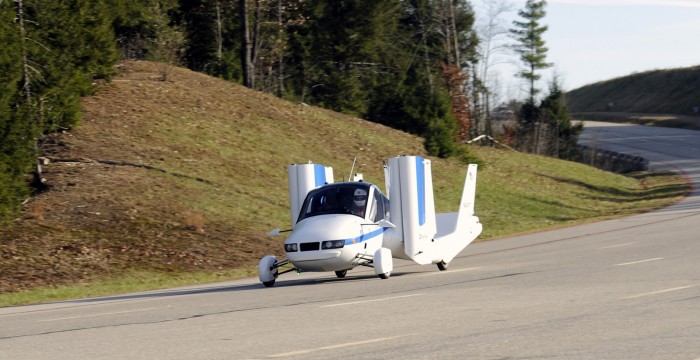Flying Cars Now Seem a Bit Less Ridiculous, but Not Much
Flying cars have always been something of a joke in technology circles. They’re the future, and always will be, the saying goes.
Well, now we might have to take them just a teeny bit more seriously. Like many nerds, Google cofounder Larry Page is evidently captivated by the Jetsonian concept of on-demand air transportation; and so he is bankrolling not one but two companies developing small aircraft prototypes: Zee.Aero and Kitty Hawk. These companies, along with a handful of other startups, and even some large aerospace companies, are developing designs for vehicles that might someday autonomously transport one or more people through the skies.
Page seems determined to prove he can do something more ambitious, and from certain angles it can seem like flying cars might finally be ready for takeoff. In particular, the technology behind small drone aircraft is becoming commoditized, and the hardware and software necessary for automated mapping and navigation is also developing quickly.


There are, however, still huge problems to overcome. For one thing, although electric power has come a long way, the kind of power needed to carry a person through the air would still require large, heavy, and expensive batteries. Also, the skies may seem easier to navigate than busy roads, but fully automated flying would need to be incredibly robust, especially if the passengers aren’t qualified to pilot the aircraft in an emergency.
One company developing compact personal aircraft is Terrafugia, based in Woburn, Massachusetts. Several years ago, the company demoed a prototype aircraft, which actually seemed more like a plane that rolls than a car that flies, and which cost $279,000. The company’s latest prototype, a hybrid electric vertical takeoff and landing (VLOT) contraption called the TF-X, looks suitable for a sci-fi film in a mocked up promotional video, but the company says it is still eight to 12 years away from being launched. In other words, for the time being at least, it’s still the future.
(Sources: Bloomberg, Boston Globe)
Keep Reading
Most Popular
Large language models can do jaw-dropping things. But nobody knows exactly why.
And that's a problem. Figuring it out is one of the biggest scientific puzzles of our time and a crucial step towards controlling more powerful future models.
How scientists traced a mysterious covid case back to six toilets
When wastewater surveillance turns into a hunt for a single infected individual, the ethics get tricky.
The problem with plug-in hybrids? Their drivers.
Plug-in hybrids are often sold as a transition to EVs, but new data from Europe shows we’re still underestimating the emissions they produce.
Stay connected
Get the latest updates from
MIT Technology Review
Discover special offers, top stories, upcoming events, and more.